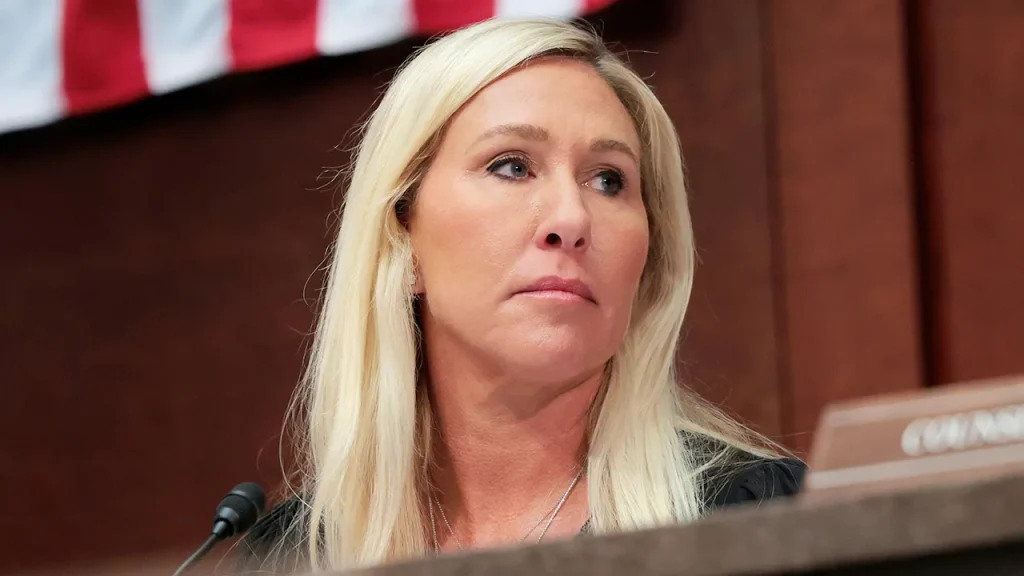Republican Representative Marjorie Taylor Greene of Georgia has announced that she will not be running for the Senate in the 2026 elections, much to the relief of some fellow Republicans who feared her polarizing character. In a statement released via social media, Greene criticized the Senate as an ineffective institution designed to obstruct the people’s will. Her announcement follows that of Georgia Governor Brian Kemp, who also opted out of a potential Senate bid, leaving Republicans to look for viable candidates to take on Democratic incumbent Jon Ossoff.
| Article Subheadings |
|---|
| 1) Greene’s Decision Not to Run |
| 2) Criticism of the Senate |
| 3) Alternate Republican Candidates |
| 4) Political Landscape in Georgia |
| 5) Future Aspirations |
Greene’s Decision Not to Run
On social media, Marjorie Taylor Greene expressed her decision to forgo a 2026 Senate run, citing local and national political dynamics. Greene represents a strongly conservative district in northwest Georgia, where she has maintained a significant following among MAGA supporters. Her statement underscores a strategic choice, reflecting careful consideration of how a contentious bid could affect her political capital and broader party dynamics.
In her announcement, Greene pointedly addressed current Democratic Senator Jon Ossoff, whom Republicans view as vulnerable in the upcoming elections. Despite her serious critique of Ossoff, her decision not to run signals a readiness to focus on her current position and legislative priorities instead of a high-stakes campaign that could polarize the Republican voter base in Georgia. Greene’s sentiment echoes a growing concern within Republican leadership that a Greene candidacy could create divisions.
Criticism of the Senate
Greene has not held back in her assessment of the Senate, stating,
“The Senate is where good ideas go to die.”
She believes that the legislative body is flawed, positing it as a mechanism designed to stifle rather than facilitate change. Her perspective draws from frustrations shared by some within the party, who feel that the Senate prioritizes compromise over concrete action, often leading to stagnation.
In her announcement, Greene elaborated on her disillusionment, asserting,
“the Senate doesn’t work. It’s designed to obstruct the will of the people and protect the Uniparty’s grip on power.”
This sentiment resonates with a segment of the Republican base that seeks more aggressive representation in Washington. Greene’s comments reflect a broader critique of established political norms, where many voters increasingly perceive a disconnect between elected officials and their constituents’ needs.
Alternate Republican Candidates
Following Greene’s announcement, other Republican leaders have begun to consider their options for a run against Ossoff. Notably, Buddy Carter, a Georgia Congressman, has already declared his intention to run. Various other Republican figures, including Mike Collins, Rich McCormick, and others, have also shown interest in entering the race.
Political analysts suggest the Republican primaries in Georgia could become highly competitive as several notable figures vie for the opportunity. With Greene and Kemp stepping aside, the landscape opens up for fresh candidates to stake their claim in a pivotal race that could impact the balance of power in the Senate.
Political Landscape in Georgia
As Georgia has emerged as a battleground state, the implications of the upcoming elections cannot be overstated. Greene’s decision signifies a potential shift in the political landscape, especially following Governor Kemp’s announcement not to run. Jon Ossoff, facing scrutiny from conservative critics, is also under pressure to maintain his position against an energized Republican base.
Republican strategists are closely monitoring developments as they ponder how to capitalize on the perceived vulnerabilities in Ossoff’s campaign. Greene’s harsh criticisms and calls for radical change underline the urgency perceived by many in the party to nominate a candidate who can galvanize significant support and challenge Democratic dominance in Georgia.
Future Aspirations
While Greene has ruled out a Senate campaign, she has not closed the door entirely on her political ambitions. Earlier this year, she hinted at possible considerations for a gubernatorial run in an attempt to successively fill the position being vacated by Brian Kemp.
Being term-limited, Kemp’s exit could create an opportunity for other ambitious Republicans, including Greene, to pivot their focus. Greene’s political trajectory suggests she remains a key figure in the Georgia Republican Party, with plans to leverage her influence in forthcoming elections, regardless of her immediate decision regarding the Senate.
| No. | Key Points |
|---|---|
| 1 | Marjorie Taylor Greene announces she will not run for Senate in 2026. |
| 2 | She criticizes the Senate for its role in obstructing meaningful legislation. |
| 3 | Other Republicans are emerging as potential candidates against Jon Ossoff. |
| 4 | The political dynamics in Georgia are shifting with the upcoming elections. |
| 5 | Greene hints at future political aspirations, including a potential gubernatorial run. |
Summary
The decision by Marjorie Taylor Greene not to run for the Senate marks a significant moment in Georgia’s political landscape. Her critical stance toward the Senate indicates a broader dissatisfaction among Republican voters, while simultaneously opening doors for new candidates to emerge in the race against Jon Ossoff. As the dynamics evolve, the focus will not only be on the upcoming elections but also on the future strategies of figures like Greene, who remain influential within the party.
Frequently Asked Questions
Question: Why did Marjorie Taylor Greene decide not to run for the Senate?
She cited frustrations with the Senate’s inefficacy, expressing a belief that it is a platform designed to obstruct meaningful legislation.
Question: Who are some potential candidates to run for Senate from Georgia?
Notable candidates include Republican Congressman Buddy Carter and Representatives Mike Collins and Rich McCormick, among others.
Question: What implications does Greene’s decision have for the Republican Party in Georgia?
Her decision could reshape candidate dynamics and strategies, allowing for new faces to emerge in a critical race that may affect the Senate’s balance of power.
